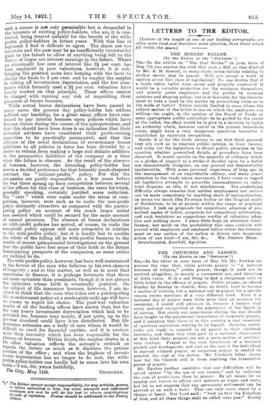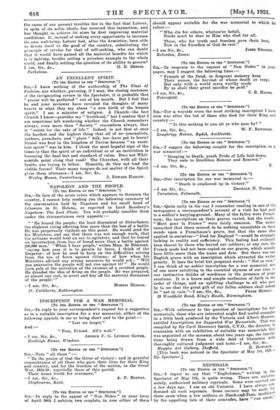THE CHURCHES AND LABOUR. (To THE EDITOR or TX/ "
SPECTATOR.")
his letter in your issue of May 7th Mr. Fawkes ex- presses the view that, while private prayer is "a natural outcome of religion," public prayer, though it need not be omitted altogether, is mainly a ceremonial act, and therefore of little value. It is a sad thing to find a clergyman with so little belief in the efficacy of prayer. Public prayer, as offered Sunday by Sunday in church, does, no doubt, tend to become a matter of routine, but a national call to prayer for a specific reason rouses emotions of a very different kind. Even if a national day of prayer were little more than an occasion for ceremony, I would still advocate it, because I believe that every national recognition of the supremacy of the Spirit is of service. But surely our experiences during the war should have taught us the paramount importance of corporate prayer, and I maintain that there is in this country a vast reservoir of spiritual aspiration waiting to be tapped. Growing multi- tudes are ready to respond to an appeal to their spiritual instincts, and when they take part in a national observance of this kind their prayers are not a mere matter of perfunc- tory routine. Prayer is the very foundation of a nation's growth and development, and just as the soul of the individual is starved without prayer, so corporate prayer is needed to nourish the soul of the nation. Mr. Fawkes's letter shows how far the Church still is from realizing the irresistible power of prayer. Mr. Fawkes further considers that our difficulties will be solved rather "by the use of our reason," and by reducing the cost of production, than by prayer. By all means let us employ our reason to adjust such matters as wages and costs, but let us not suppose that any permanent settlement can be arrived at on such a basis. That can only come about by a change of heart. Our Lord said: " Seek ye first the Kingdom of God, and all these things shall be added unto you." Surely
the cause of our present troubles lies in the fact that Labour, in spite of its noble ideals, has reversed this injunction, and has thought to achieve its aims by first improving material conditions. If, instead of seeking every opportunity to increase its own well-being, Labour had, after the Armistice, been able to devote itself to the good of the country, substituting the principle of service for that of self-seeking, who can doubt that it would have gained all the material benefits for which it is fighting, besides setting a priceless example to the whole world, and finally settling the question of its ability to govern?



































 Previous page
Previous page